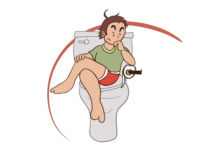Parent Corner: Choosing Your Challenges
- Share
- Tweet
- Pin
- Share

by KAREN COREKIN-DeLaMER, Education and Community Relations Coordinator, Northern Door Children’s Center
Dear Karen,
I’m a mom to two daughters, ages 4 and 6. They are bright, active girls, and they both do well in school. My mom spends a lot of time with us and helps with child care when the girls’ dad and I have to work night or weekend shifts.
I’ll admit the kids can be a handful sometimes, arguing and tattling on each other. It really bothers my mom that we don’t give them more discipline than we do. Their dad and I work long hours, so when we have time with our girls, I don’t want to spend it yelling at them for every little thing. It seems like whining and not wanting to pick up toys is just normal kid stuff.
But is my mom right? Should we be disciplining them for everything they do wrong?
— Love My Kids the Way They Are
Dear Love My Kids,
First let me say that it’s wonderful to have your mom to help with your children. It certainly makes your life less stressful to have her available when you both need to work.
That said, you and the girls’ dad are the ones who should make decisions about what is appropriate behavior in your home. You are 100% right that those behaviors are kid stuff, and very typical for children this age. You and their dad are the ones who should address the issues that you feel are important, and you can share this with your mom.
There are lots of things you can do to guide your children that are low stress. You’ve probably heard the saying “Pick your battles.” I prefer to think of it as “Choose your challenges.” This is the idea that you decide which behaviors to tackle and which you can just let slide or ignore, except for things that are safety related (hitting, standing on tables and the like).
It sounds like tattling and arguing with each other are the issues you feel are problematic. These are the challenges to put your attention on, and you can safely take your attention off the others if they don’t bother you.
By helping your children learn to settle their arguments, you will automatically decrease the tattling, so let’s start there. The most important thing you can give your daughters is what to say to each other when things get tense and a fight is brewing. Phrases such as “That hurts my feelings,” “I don’t like it when you do that” and “Please stop” can allow them to tell each other how they feel about what is happening between them. You can model the words and have your girls practice them.
I’m not a huge fan of forcing children to say “I’m sorry.” If they want to, they can, but it’s often more meaningful to do something to make it right. For example, if one of your daughters knocks over a structure the other has built, then helping her sister rebuild it is a meaningful way to make amends. Or if one has hurt the other’s feelings, a hug may go a long way to soothing that sadness.
You and their dad will need to be teachers and mediators until they’re able to work things out themselves. It may take awhile to get them in the habit of talking about their problems with each other, but it’s an excellent way to teach communication skills and build a strong, caring relationship between them. This is information that you can share with your mom, and the girls can proudly show their grandma how they’ve learned to settle their disagreements.
A fun way to deal with tattling is to put a “tattle friend” up on a wall where the girls can easily reach it. This could be a picture of one of their favorite cartoon characters or superheroes. When one of them feels the need to tell on the other, she can go to the tattle friend and whisper the tattle. This often lightens the mood, and the girls may end up laughing as they report to their special “friend.” Let them know, however, that if someone is hurt or may be hurt, they need to tell you immediately.
By choosing your challenges, you can take the pressure off everyone and save your energy for dealing with the things that are important to you as a family.
Karen Corekin-DeLaMer holds degrees in elementary, special and early-childhood education. She has been a teacher, administrator and parent educator since 1984 and is the education and community-relations coordinator for Northern Door Children’s Center in Sister Bay. Email your questions to her at [email protected].



